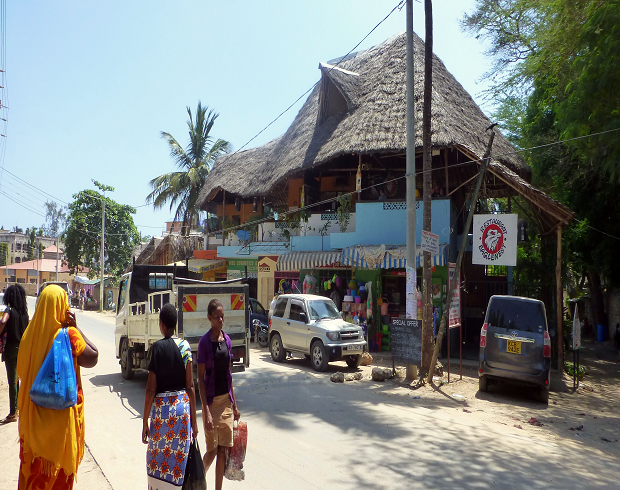Nestled on the southernmost tip of Kilifi County, Mtwapa is a bustling kaleidoscope of cultures, economies and social systems. The Mombasa-Malindi highway splits the town into an east side and west side, with various activities happening along the kilometer long central business district. Dust devils constantly swirl around the unpaved sidewalks that front various commercial and residential buildings squeezed side by side. The population is extremely diverse from a cultural perspective, with a significant number of retired foreigners residing there. Business owners as well as workers come from the hinterland, which is confirmed by the various bus company offices dotting the town offering express buses headed all the way to Western Kenya directly from Mtwapa.
If you’re visiting Mtwapa, you are strongly encouraged to toss any sanctimonious morality crown you may be wearing into a dustbin as soon as you cross the Mtwapa creek bridge. The first thing that hits you is that there is a bar – or the more urbanized term “lounge” – at every corner. During the day, the desolate tables belie the heaving weight of the alcoholic and carnal aspirations of the previous evening’s revelers. The second stark discovery is that there are as many chemists as there are buildings in the town. I walked into two different chemists that were within 10 metres of each other. “What is your unique selling proposition that makes you stand out?” I asked as I couldn’t understand how any business could remain prosperous with such intensity of competition. Veronica, the owner of one of the chemists, was very forthcoming. “I came here from Bamburi where it was very slow. I’ve been in business for ten years and my customers are different from that chemist over there,” she pointed to the one directly across the street. “Each of us have our own customers, and the business is enough for all of us.” Jacob, her competing neighbor to the left, pretty much said the same thing. For both chemists, their fastest moving consumable items were condoms, the morning after pill and Viagra. Veronica chuckled as she reflected on this, “Huku ni Sodom na Gomorrah!”
Further down the street is an open air vegetable market. I sat with Mary, who is the chairlady of the traders welfare society. The market is fairly cool, despite being out in the open due to the various trees lined up on one side. About 153 traders pay Kshs 500 a month to the owner of the land as “rent” and pay a further Kshs 500 a month to the Kilifi county government as license fees. Mary is slightly bitter as they were moved from their previous location on the main high street due to what was going to be a road expansion. As it was public land, they did not need to pay any rent and therefore had lower overheads. Their economic situation was further compounded by the opening of two large brand supermarkets within 300 metres of each other. The supermarkets now provide fresh vegetables and pre-cut sliced fresh fruit such as pineapple and melon, which were the mainstay of the vegetable traders. Consequently foot fall has significantly reduced and there is no particular unique attraction to bring shoppers to the open air market. County government innovation is greatly required here, to help the traders build permanent stalls that provide various fresh ingredients and street food that would enable a memorable shopping experience for the vibrant town population. Mary shrugs her shoulders in the typical Kenyan resignation and acceptance of her lot in life. “Many women here are not sleeping at night worrying about how they will pay school fees and feed their children. I sleep at 11 pm and leave the house by 4 am in order to get to the Kongowea wholesale market before the good produce is sold out,” she explained in Swahili. She didn’t want any government handouts, just a fair trading environment in what was becoming an increasingly difficult way to do business.
Mtwapa is a town of stark contrasts and varying populations that ebb and flow during its 24 hour economic life cycle. The bars are desolate by day and vibrant at night, creating an intricate web of symbiotic business such as taxis and tuk tuks, late night street food sellers, recreational drugs and short term lodging options. The most outstanding social element of this town however emanates from the lack of a morality lens: various election cycles have blown over a peaceful and non-judgmental population. In Mtwapa everyone is accepted at face value and not skin color or tribal pedigree. There’s no time for that election tension nonsense out there: life is too short and must be lived within 24 hours a day.
Twitter: @carolmusyoka

 carolmusyoka consultancy
carolmusyoka consultancy
 @carolmusyoka
@carolmusyoka


